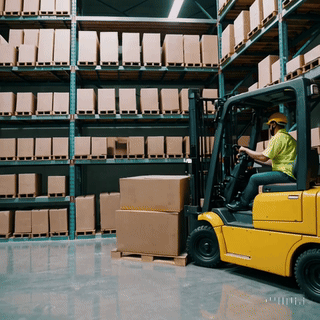Industry is the engine of the Brazilian economy and represents one of the most complex sectors in terms of accounting, tax and fiscal management.
From controlling inventories and production costs to complying with specific ancillary obligations such as Bloco K and FCI, industrial companies face a challenging and highly regulated routine.
In this context, having a accounting for industries specialized it's not just a question of compliance, it's a smart strategy to reduce costs, increase efficiency and ensure fiscal and operational compliance.
The importance of specialized accounting in the industrial sector
Accounting in an industry goes far beyond the basics. It needs to reflect the reality of a production environment, in which each stage, from the purchase of inputs to the dispatch of the final product, has a direct impact on the calculation of taxes, costs and financial results.
While retail and service companies deal with simpler operations, industry works with processing of raw materials, This requires strict control of costs, stocks and production processes.
For this reason, a generic accounting firm is unlikely to be able to efficiently meet the demands of this segment.
One specialized industrial accounting helps the company to keep control of its manufacturing costs, optimize the use of inputs, identify production bottlenecks and correctly take advantage of all available tax credits and incentives.
Cost accounting: the basis of industrial management
Cost control is at the heart of industrial accounting. It is through cost accounting that the company identifies the real production cost of each item, ensuring adequate pricing and competitiveness in the market.
This calculation takes into account three main components:

- Direct raw materials: Inputs used in the manufacture of products.
- Direct labor: Cost of labor used in production.
- Manufacturing overhead costs: Energy, machine maintenance, depreciation and other operating costs.
Specialized accounting helps define the ideal costing methodology, These include absorption costing (required by tax legislation) and activity-based costing (ABC), which is more suitable for management analysis.
In addition, the accounting firm implements cost centers, carries out periodic inventories and uses methods of stock valuation (FIFO/PEPS, average cost), ensuring accurate information and reducing losses.
Tax management and industrial tax assessment
A taxation of industries is one of the most complex in the country, involving federal, state and municipal taxes, as well as special regimes.
The main taxes include:
- IPI (Tax on Industrialized Products): It is levied on manufacturing and requires correct tax classification (NCM) and control of incoming and outgoing credits.
- ICMS and ICMS-ST: The first is the tax on the circulation of goods, and the second is the tax substitution regime, which is very common in industries that sell to other states.
- PIS and COFINS: Calculated on turnover, with specific rules for the non-cumulative regime (Real Profit).
As of 2026, the transition to the new taxation system begins, using the so-called Dual VAT, in which the IBS (state/municipal) will gradually replace ICMS and ISS, and the CBS (federal) will replace PIS, Cofins and IPI over the next few years. This change will profoundly alter the calculation of sales and consumption taxes and will require accounting and tax systems to adapt.
One accounting for industries needs to keep up with state and federal legislation, monitor Confaz updates, control tax benefits and ensure that the company doesn't pay more tax than necessary.
For Presumed Profit companies with turnover above R$ 5 million/year, an increase of 10% must be applied to the IRPJ and CSLL calculation basis on the portion that exceeds this amount (LC 224/2025). In addition, the firm should monitor recent changes to the ICMS-ST and state tax benefits.

Accessory obligations and industrial tax compliance
Industries are among the most inspected sectors in the country. Therefore, compliance with accessory obligations is essential to avoid assessments and fines. Specialized accounting takes care of every detail of these requirements, such as:
- SPED Fiscal and Block K: This obligation requires the detailed submission of stock and production movements to the tax authorities. Block K is one of the most sensitive points, as any discrepancies can lead to notifications and penalties.
- REINF and DCTFWeb: Declarations that gather information on social security withholdings, especially important for companies that use CPRB (Social Security Contribution on Gross Revenue), This benefit applies to some industrial sectors.
- FCI (Import Content Form): Required of industries that use imported inputs, it informs the percentage of foreign material in the final product.
- EFD-Contributions: Aimed at controlling PIS and Cofins, it is mandatory for Real Profit companies.
A industrial accounting management ensures that all these declarations are submitted correctly, reducing tax risks and guaranteeing full compliance with current regulations.
Tax planning and taking advantage of tax incentives
One of specialized accounting for industries is the tax planning strategic.
With it, you can identify opportunities to legally reduce the tax burden through incentives, special schemes and tax credits.
Among the main programs and benefits that can be taken advantage of are:
- Presumed ICMS credits granted by some states.
- Special tax regimes for sectors such as the automotive, metallurgical and chemical industries.
- Good Law, which allows tax deductions for companies that invest in Research and Development (R&D).
- PPB (Basic Productive Process) e Information Technology Law, These are aimed at the technology and electronics industries.
- Regional incentives of states and municipalities seeking to attract factories and industrial plants.
An accountant with a command of industrial legislation also guides the company to plan interstate purchases of inputs to maximize ICMS credits and avoid tax accumulations.
Do you have a business or are you thinking of starting one? Then watch the video below and find out why specialized accounting can be the key to reducing costs, optimizing processes, and making your operation more profitable and efficient.
Accounting advice and tax intelligence for industrial growth
In addition to taking care of tax and financial routines, a accounting for industries must act in a consultative manner, helping the company to grow strategically.
In practice, this means applying tax intelligence to identify savings opportunities, structure corporate planning and guide investment decisions.
A CLM Controller Accounting realizes detailed analysis of tax scenarios, simulating different frameworks and regimes to find the most advantageous configuration.
It also offers support in internal audits and corporate reorganizations, guaranteeing legal certainty and transparency in operations.
With this analytical view, the industrial manager comes to see accounting as a tool to support factory management and expansion, and not just as a tax obligation.
The result is an industry that is more efficient, financially healthy and prepared to compete in an increasingly demanding and globalized market.
Accounting for exporting and importing industries
Many Brazilian industries operate in foreign trade, exporting or importing inputs and finished products. This brings additional accounting and tax challenges, such as:
- Control of exchange rate variations: Fluctuations in the dollar have a direct impact on costs and results.
- Special customs procedures: Drawback, for example, allows the exemption or suspension of taxes on imported inputs used in exported products.
- Management of accumulated ICMS credits: Exporting industries often accumulate ICMS credits, which need to be controlled and used correctly.
A internationalized industrial accounting masters these issues and ensures that the company operates safely and efficiently in the global market, avoiding calculation errors and loss of competitiveness.
Management reports and decision-making support
More than complying with legal obligations, excellent accounting must generate strategic insights.
In the case of industries, well-structured management reports are essential for financial control and production efficiency.
The main reports offered by a specialist firm include:
- Profitability analysis by product line.
- Cost reports by production center.
- Break-even statement.
- Comparison between budgeted and actual costs.
- Mapping waste and negative margins.
This information helps managers and directors to identify more profitable products, reduce losses and adjust pricing strategies.
In CLM Controller Accounting, These reports are integrated into the accounting routine and can be supplemented with Financial BPO services, providing a complete overview of business performance.
Essential accounting and financial indicators for the industry
Efficient industrial accounting goes beyond recording information: it provides precise metrics that guide the company's strategy.
Among the main performance indicators used are:
- Unit cost of production: It lets you know how much it costs to manufacture each product, helping you to price it correctly.
- Contribution margin: It shows how much each product contributes to covering fixed costs and generating profit.
- Stock turnover: It measures efficiency in the use and renewal of stocks.
- Break-even point: identifies the minimum volume of production required for the company not to make a loss.
- EBITDA (earnings before interest, taxes, depreciation and amortization): Indicator used to measure operational performance and compare with competitors in the sector.
- Financial cycle: It measures the time between paying for inputs and receiving sales, helping with working capital planning.
These reports are essential for controlling costs and improving profitability the factory.
A specialized law firm like CLM Controller helps to interpret these figures, offering analyses that point to possible bottlenecks, opportunities to reduce waste and optimize margins.
In addition, these indicators serve as a basis for budget planning and financial projections, This allows the industry to plan expansions with certainty and avoid surprises in the cash flow.
Integration with BPO Finance and management consulting
CLM Controller also offers Financial BPO, is a service that integrates the industry's accounting and financial sectors. This means that clients can centralize control of accounts payable and receivable, cash flow, bank reconciliation and financial performance indicators in a single system.
This integration reduces errors, increases productivity and allows for more agile decisions, since financial and accounting figures go hand in hand.
The industry now has a consolidated vision of costs, revenues and operating margins, without having to maintain large in-house teams.
Compliance, auditing and tax security
Tax and accounting compliance is one of the pillars of good corporate governance. In the industrial sector, it is even more important, given the complexity of the obligations and the high values involved in operations.
A CLM Controller operates with a total focus on compliance, offering:
- Internal preventive audits.
- Review of fiscal and tax assessments.
- Risk analysis and compliance with IRS and SEFAZ regulations.
- Training for internal teams, ensuring alignment with good compliance practices.
This approach significantly reduces the risk of assessments, tax liabilities and labor contingencies.
Industrial sectors served by CLM Controller
A CLM Controller is a reference in accounting services for industries in São Paulo and region, with experience in various segments, including:
- Metal and auto parts industries.
- Chemical and pharmaceutical industries.
- Food and beverage industries.
- Textile and clothing industries.
- Technology, electronics and equipment industries.
With a highly qualified team, CLM combines technical expertise, technology and business vision to deliver solid results and customized solutions for each client.
Strategic partnership between industry and accounting
More than just a service provider, the ideal accounting firm should act as strategic partner in industrial management.
In practice, this means understanding the production model, participating in results meetings and supporting the decision-making process with accurate financial and tax information.
A CLM Controller Accounting stands out for adopting a consultative approach, combining technical expertise, technology and business vision.
The company works hand in hand with directors and financial managers, interpreting reports, adjusting tax strategies and promoting continuous improvements.
This proximity results in tangible gains:
- Reduced operating and tax costs;
- Improved stock control and production costs;
- Prevention of tax and labor liabilities;
- More assertive financial planning;
- Increased profitability and competitiveness.
Industrial companies that adopt this partnership model reap sustainable results in the long term, maintaining fiscal compliance, transparency and financial predictability, indispensable pillars for those who want to grow solidly in the market.
Conclusion
Accounting for industries is a complex area that requires technical knowledge, strategic vision and constant updating.
Companies that rely on specialized accounting management not only comply with their tax obligations, but also gain operational efficiency, reduce costs and strengthen their corporate governance.
In CLM Controller Accounting, We combine experience in the industrial sector with technology and consultative methodology, helping factories and industries to grow safely and profitably.
Your industry deserves accounting that matches the complexity of the business. Let CLM Controller take care of the accounting and tax side while you focus on production - efficiency gains and security guaranteed!










